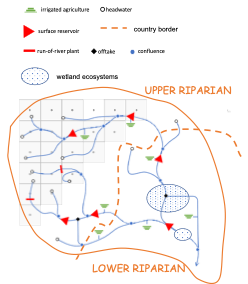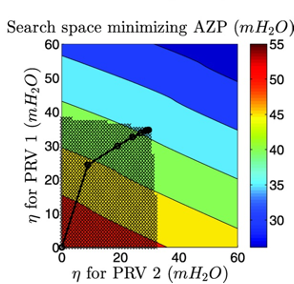Teaching
My teaching activities closely incorporate my research work across the disciplines of control, mathematical optimisation, water management and its nexuses with agriculture and energy.
Integrated Water Resources Mangement (CIE4450, 4EC MSc course in the Master Civil Engineering)
 Through a series of interactive lectures, stakeholder analysis and role play exercises, modelling exercises using integrated assessment tools (eg. WEAP), and a group project, the course Integrated Water Resources Management (IWRM) deals with pressing water challenges of today and the future. The lectures introduce water management issues and a number of topics that are important for IWRM in several transboundary river basins (eg. the Rhine, Nile and Volta Basins). The role-play simulation explores some of the social processes that, together with technical knowledge, determine water management.
Through a series of interactive lectures, stakeholder analysis and role play exercises, modelling exercises using integrated assessment tools (eg. WEAP), and a group project, the course Integrated Water Resources Management (IWRM) deals with pressing water challenges of today and the future. The lectures introduce water management issues and a number of topics that are important for IWRM in several transboundary river basins (eg. the Rhine, Nile and Volta Basins). The role-play simulation explores some of the social processes that, together with technical knowledge, determine water management.
Module 2.3: Optimisation: from formulation to solution in WRE (2 EC MSc course as part of the CIE5431 Research Skills 1)
 Like in most engineering and scientific disciplines, research problems in water resources engineering seek to optimise something in the design and operation of complex systems. One design example is the optimisation of reservoir development (decisions on location, sizing, operational schedules, etc.) constrained by future water needs for energy, irrigation, flood mitigation, and uncertainties associated with climate change. In operational scenarios, the management of control structures and pump scheduling in irrigation and transport water systems require solving optimisation problems periodically. Optimisation problems are also ubiquitous in various hydrological modelling, satellite data assimilation, and time-series analysis tasks.
Like in most engineering and scientific disciplines, research problems in water resources engineering seek to optimise something in the design and operation of complex systems. One design example is the optimisation of reservoir development (decisions on location, sizing, operational schedules, etc.) constrained by future water needs for energy, irrigation, flood mitigation, and uncertainties associated with climate change. In operational scenarios, the management of control structures and pump scheduling in irrigation and transport water systems require solving optimisation problems periodically. Optimisation problems are also ubiquitous in various hydrological modelling, satellite data assimilation, and time-series analysis tasks.
The course CIE5431 gives a selection of basic and advanced research skills concerning data collection, data analysis and advanced modelling and programming. As one of the modules within these themes, I offer an introductory course as an application-oriented primer in optimisation. Its aim is to motivate the use of optimisation models in various strategic planning and operational problems within water resources engineering and introduce how optimisation is used in several other application domains. We will learn how to represent real world problems as mathematical models to formulate a mathematical optimisation problem; i.e. model different objectives, introduce physical and performance constraints, identify what class of optimisation problems a formulation belongs to and finally solve the problem with appropriate numerical tools. The student will also become familiar with various algebraic modelling languages (eg. Pyomo, JuMP in Julia), and solvers like IPOPT and Gurobi.
For more details please also refer to Publications.
